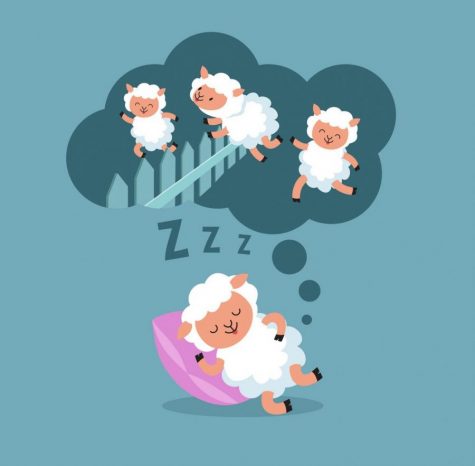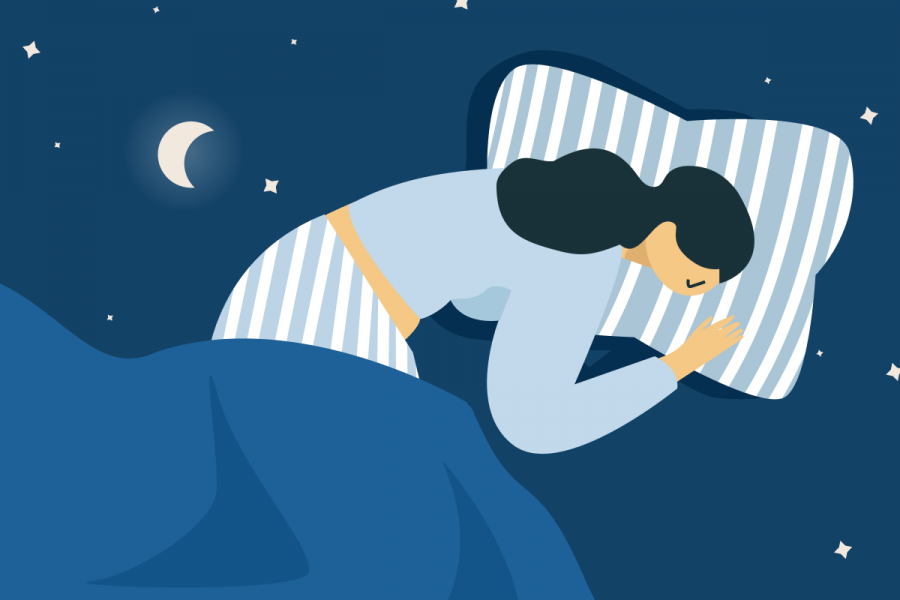The Struggle to Fall Asleep
https://www.google.com/url?sa=i&url=https%3A%2F%2Fmymoodpath.com%2Fen%2Fmagazin%2Fsleep-problems-depression%2F&psig=AOvVaw3qDT8Fm3Oq4ZydoPRRYPwZ&ust=1615909391923000&source=images&cd=vfe&ved=0CAIQjRxqFwoTCLC5493Rsu8CFQAAAAAdAAAAABAD
April 14, 2021
As we begin the 4th quarter, students tend to have a lot on their minds. Whether it’s a test the next day keeping one up, or excitement for the summer, sleeping troubles are something that impacts everyone to an extent. It is recommended that teenagers get 8-10 hours of sleep per night in order to function their best. Sometimes the hardest part surrounding getting these hours is the amount of time one spends laying in bed, wishing they were asleep but not being able to make that next step. If you find yourself struggling to fall asleep at night, these ideas may help you achieve the amount of rest you need.
HAVE A CONSISTENT NIGHTTIME ROUTINE
The human brain likes to sync certain actions with being awake and falling asleep. If you have a consistent routine you go through every night, your brain will begin to recognize those actions and connect them to tiredness, which will allow your mind and body to be more relaxed and likely to fall asleep quicker.
Going to sleep at around the same time every night is important as well, although not as reasonable because students have a lot of factors that can change when they have time to fall asleep, such as practices, work, homework, etc. If you are unable to keep your sleep schedule consistent, at least attempt to do so with your routine.
AVOID SCREENS
The blue light coming from our electronics wakes up the mind and halts the production of melatonin, making it more challenging for it to be able to wind down when it comes time to fall asleep. Some of the best ways to stay entertained but avoid electronics are (but not limited to) reading, drawing, writing, and doing homework on a piece of paper. These actions allow the mind to calm down and prepare to fall asleep easier. The more time you spend away from screens, the easier it will be able to fall asleep.
If you struggle with avoiding screens before bed, try to at least use them at a low brightness, and even consider turning on the “night shift” mode that may be available on your phone. Blue-light blocking glasses can also be helpful in accelerating the sleep process if you can’t keep away from a screen.
COUNT
Many people have grown up hearing from their parents to “count sheep” to help them fall asleep quicker. Envisioning sheep jumping over a fence or walking through a field with each number you count. The sheep can be the same color or different colors; whatever feels right to you is what will connect to the best sleep. As ridiculous as it may sound, this idea is very helpful. When one is focused on counting something like sheep, other thoughts are pushed aside and disregarded. This allows the mind to be more at peace and less caught up in endless thoughts that keep many up at night. Sheep are not the only thing that can be count, though. Counting your breath (in one, out two, in three, out four…) to ten and then restarting your count after that is something you can try as well. If your mind continues to wander after trying out these simple ways to count, you can try counting down from 300 by 3s (300, 297, 294…) or other variations of that.

Counting allows your mind to keep busy on something that is thoughtless so then it is less likely to be consumed with worrisome thoughts that keeps you up at night.
STAY COOL AND CALM YOUR SENSES
The cooler your body is, the more likely it is to initiate sleep. Make sure you’re not freezing cold, but also not sweating from warmth. Generally, try to sleep in a room that is 68-72 degrees Fahrenheit to promote the best sleep. Everyone’s bodies react differently to different temperatures, so make sure that you are comfortable.
Essential oils can also promote relaxation and calm the mind and body. Lavender oil is a well loved oil to promote relaxation and help sleep. Lavender is shown to not only help one fall asleep quicker, but it also causes a better sleep overall. You can apply this directly to your skin (recommended to add to the bottoms of your feet and your spin) if you use a diluted solution. Use in a diffuser, lotion, pillow spray, etc. is also effective.
Start by implementing these ideas one by one if trying them all is too overwhelming. You know your body and what it needs better than anyone else, so try your best not to over think falling asleep at night. As you slowly bring these ideas into your life, you will notice your sleep progressively becoming better and better.


